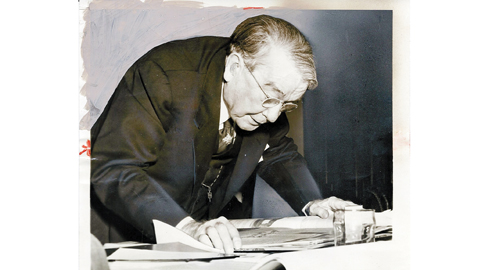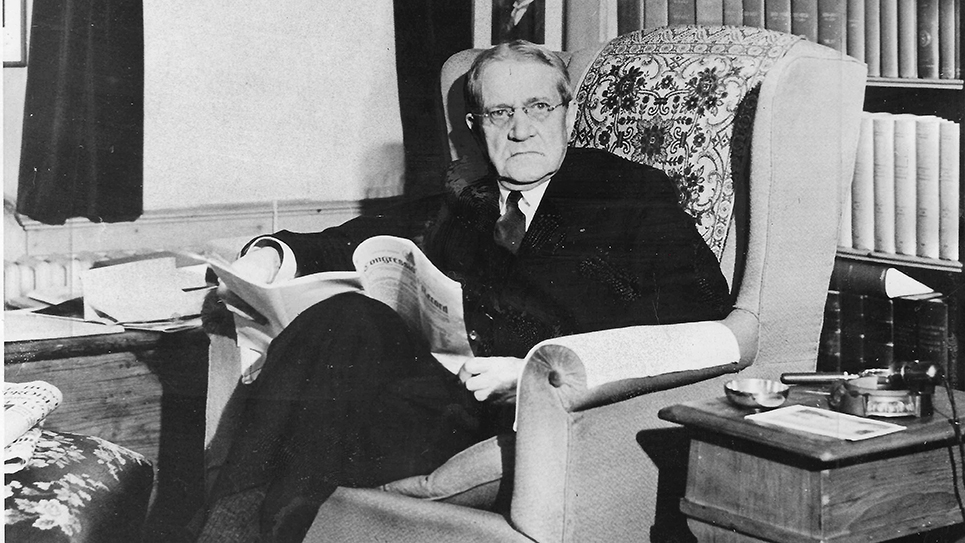By Ray Hill
Senator Kenneth D. McKellar’s reputation has suffered through the years largely due to his feud with David E. Lilienthal. Lilienthal was one of the original Directors of the Tennessee Valley Authority. Like all of Kenneth McKellar’s feuds, it was a no holds barred affair and his hatred of Lilienthal became something of an obsession for the senator. Some historians have labeled McKellar a reactionary, ultra conservative, and an opponent of the Tennessee Valley Authority. None of the charges are true and the latter charge is preposterous; for one thing, it would have been impossible for any officeholder in Tennessee to survive politically had he truly been opposed to the TVA.
The Tennessee Valley Authority certainly had some powerful opponents in Congress and without McKellar’s influence inside the United States Senate the agency would, at the very least, likely had suffered from a serious lack of funding. McKellar was the ranking member of the powerful Appropriation Committee, through which every federal dollar to be spent passed. With the aged and oftentimes ill Carter Glass as chairman of the Appropriations Committee frequently absent, McKellar’s influence inside the committee increased. Pitched battles were fought over funding for the TVA inside the Appropriations Committee, some of which were won by a single vote. McKellar’s shrewd bargaining and power helped to sustain the agency and to some he was the “rich uncle of TVA”.
It was certainly true K. D. McKellar was highly resentful of Nebraska progressive George W. Norris. McKellar did not think Norris an especially hard working senator and others in Congress realized McKellar’s jealousy of Norris’ sponsorship of the legislation creating the Tennessee Valley Authority. Author Steven Neuse quoted from McKellar’s unpublished memoirs a segment which recorded the Tennessee senator’s bitterness.
McKellar recalled that “from 1916 to 1932, if Mr. Norris aided in the remotest kind of way my fights for these dams on the Tennessee River, I never heard of it.”
Aside from his own vote, Senator Norris likely had no influence on the appropriations process nor did he make any real attempt to influence it. It was McKellar who bore the burden of keeping TVA afloat and fending off its congressional enemies.
Even Albert Gore, who defeated McKellar in 1952, gave McKellar the lion’s share of credit for assisting the Tennessee Valley Authority, noting that the senator oftentimes succeeded in replacing funds that the Tennessee Congressional delegation could not keep in appropriations bills in the House of Representatives. Gore said he could not fairly criticize McKellar’s record on TVA.
President Franklin D. Roosevelt’s decision to have a senator from Nebraska introduce the bill creating the Tennessee Valley Authority was K. D. McKellar’s bitterest disappointment in a forty-two year congressional career.
McKellar’s bitterness poured forth in a speech in February of 1943 when he said Roosevelt had taken “away from me the credit that was due me for more than a quarter of a century’s work on these dams and for some unaccountable reason throwing the credit in the lap of Senator Norris who could not have gotten a dollar for those dams to save his immortal soul.”
Lilienthal was a passionate liberal and as such, received sympathetic coverage from much of the media. McKellar, who had been accused by at least one Tennessee newspaper of being a socialist, was a progressive senator, but he was the personal friend and political partner of Edward Hull Crump, leader of the Shelby County political machine. Together, McKellar and Crump forged a formidable statewide machine that dominated Tennessee politics for quite nearly two decades.
McKellar unabashedly filled jobs with his friends and supporters, all of whom were Tennesseans. Senator McKellar believed there were few positions or jobs for which a Tennessean was not qualified. Some have dismissed McKellar’s distaste for Lilienthal as anger at the Director for refusing his patronage demands. Lilienthal was portrayed as Simon pure, resisting the demands of a patronage hungering McKellar. The inference was clearly there was no politics involved inside the Tennessee Valley Authority. The truth is David E. Lilienthal certainly knew how to play the game and McKellar knew it as well. Roy Talbert, Jr., in his biography of TVA Director Arthur Morgan, noted Floyd Reeves, head of personnel for TVA, instructed Gordon Clapp (who would later serve as Chairman of the TVA Board of Directors) to investigate the scope of political hiring at the agency. Clapp’s report was comprehensive and painstaking. It noted Dr. Morgan had hired a crippled friend of First Lady Eleanor Roosevelt. It also noted several political hires made by David Lilienthal. Clapp concluded one such hire made by Lilienthal was at the behest of Congressman Joseph W. Byrns, who just happened to be Speaker of the House of Representatives.
Lilienthal also hired Claude P. McReynolds, who had the good fortune of having as his uncle Congressman Sam McReynolds of Chattanooga, who was also Chairman of the House Foreign Affairs Committee. Lilienthal had promised Congressman McReynolds he would find a job for his nephew. Reeves was so incensed by the notion of hiring the younger McReynolds, he wrote Lilienthal a letter angrily stating, “I prefer not to sign a letter appointing Mr. Claude McReynolds unless requested to do so by the Board.”
David Lilienthal had violated the anti-patronage clause in the law creating the Tennessee Valley Authority.
Lilienthal had hired Marguerite Owen, who had been employed by Senator George W. Norris of Nebraska before being installed as TVA’s Washington lobbyist. V. D. L. Robinson was working for Tennessee’s junior U. S. senator, Nathan L. Bachman, when he was hired by Lilienthal as a personal assistant. Gordon Clapp noted in his investigation there was no correspondence between Director Lilienthal and Robinson and there was “nothing in the application of the negotiations leading up to his (Robinson) appointment.”
Obviously, Senator McKellar knew about the political appointments and more besides. It was certainly true he was irritated his own recommendations were ignored. It only further annoyed and disgusted the senator when Lilienthal piously claimed the TVA was free of politics and political hirings.
Initially, Senator McKellar and David Lilienthal got along rather well.
David Lilienthal, thirty-four years old in 1933, was far younger than his fellow TVA Directors, H. A. Morgan and Arthur Morgan. Lilienthal also knew how to cultivate older men who held the reigns of power. Arthur Morgan complained about Lilienthal’s obvious attempt to cultivate H. A. Morgan. Lilienthal tried the same tactic with McKellar and was careful to consult with the senator on a variety of topics important to the TVA and Tennessee. According to author Steven M. Neuse in his book “David E. Lilienthal: The Journey of An American Liberal,” the TVA Director “praised the senator”. And as Mr. Neuse also noted, Senator McKellar responded in kind. McKellar informed President Roosevelt he believed Lilienthal was “splendidly equipped for the great work he is doing.”
Senator McKellar and David Lilienthal also had in common a dislike of TVA Director Arthur Morgan. Dr. Morgan had imperiously informed the powerful Tennessean that politics would not be a factor inside the Tennessee Valley Authority.
McKellar gave Morgan the perfect backhanded compliment by saying he would “be the first to praise Professor Morgan if he will stop making long-winded and perfectly useless speeches and get down to work on his job.”
As Steven Neuse notes in his book, McKellar wrote George Fort Milton, owner of the Chattanooga Times, that he believed Arthur Morgan to be “the most blundersome man in the world.” McKellar complained that if the dam building program of the TVA succeeded, it would be in spite of Arthur Morgan “instead of by his help.”
It was 1941 when David Lilienthal and Senator McKellar parted ways.
Power demands were such that TVA was considering the construction of the Douglas Dam, but the project had been held in abeyance as it would likely encounter stiff opposition from many residents in the area. To build the Douglas Dam, more than 30,000 acres of prime farmland would be inundated by TVA waters, much of which was owned by the Stokely Canning Company, which provided significant employment for many area residents. Lilienthal had backed a different plan, which called for the construction of two dams along the Holston River. Senator McKellar had endorsed the plan supported by David E. Lilienthal.
Lilienthal was pressured by reports that the Douglas Dam project would generate the most power, which would very likely be needed if America were to be prepared for war. It was then David Lilienthal made a mistake that positively enraged the tempestuous Senator McKellar. He submitted his proposal to Congress, recommending the building of Douglas Dam and never bothered to discuss the matter with Tennessee’s senior senator.
It was worse than a foolish thing for Lilienthal to do, as the TVA Director knew full well the idea would not be popular in much of East Tennessee, an area where McKellar was highly popular. Lilienthal also knew that he would have to have the powerful McKellar’s support, especially in securing the necessary funds to build the dam.
As Senator McKellar’s temper began to boil over what he considered to be a deliberate insult, opposition was swift in coming. As Steven Neuse recounts in his biography of Lilienthal, the “pro-TVA University of Tennessee president” immediately let his feelings be known in a public letter that Lilienthal called a “terrific shot at us.”
Folks in and around Dandridge began to howl and letters, telegrams and telephone calls of protest flooded McKellar’s Washington office. Finally Lilienthal wrote McKellar what Neuse calls “a thorough, professional missive” which explained the need for Douglas Dam and the rationale behind the TVA Director’s decision to abandon his previous plan to build two dams along the Holston River. Lilienthal’s biographer considered Senator McKellar’s response “mean” as the Tennessean bluntly informed the TVA Director he considered the “professional missive” to be “discourteous.” McKellar complained he felt he should have been informed, if for no other reason than because of his long support for the Tennessee Valley Authority.
Lastly, in his typically blunt fashion, Senator McKellar informed Lilienthal the Douglas Dam project would “have the most vigorous opposition from me that I am capable of giving to it.”
It was only then David Lilienthal seemed to realize the extent of his mistake and he tried to mollify the old senator. Lilienthal admitted he regretted his actions and wished he had laid out the options and his plan to McKellar “months ago.” Uneasy, Lilienthal fired off yet another letter saying how much he appreciated McKellar for “always having dealt with me in a kindly and generous spirit, minimizing my faults (of which I have many) and always giving me the benefit of the doubt.”
It was one occasion when David Lilienthal was not going to get any benefit of the doubt from K. D. McKellar. As far as the senator was concerned, David Lilienthal had demonstrated he was a liar and could not be trusted. Blunt, plain spoken, and honest, Senator McKellar had no use for anyone who lied.
McKellar’s opposition to the Douglas Dam project was implacable. It soon became quite clear the dam was never going to be built as long as Senator McKellar opposed it. Virtually the entire New Deal administration pleaded with McKellar to relent. McKellar stubbornly ignored an appeal from Vice President Henry Wallace, a man whom the Tennessean hardly regarded highly. Even an entreaty from President Roosevelt got nothing more from Senator McKellar than stony silence. Neither the House nor Senate Appropriations Committees would act while Senator McKellar remained opposed to the Douglas Dam project.
An inveterate diarist, which he clearly intended for posterity, Lilienthal became angry himself, seething that “the processes of democracy that will permit one man to block the wishes of those responsible for the war.” Foremost of those wishes were Lilienthal’s own.
It took a final appeal from FDR to convince McKellar to drop his opposition when Roosevelt insisted that construction of the Douglas Dam was vital to the war effort. With McKellar’s support, the Douglas Dam bill was passed and signed by President Roosevelt on January 30, 1942, one day after the senator’s seventy-third birthday.
McKellar’s acquiescence to the construction of the Douglas Dam hardly meant he was done with David E. Lilienthal. The feuding son of Tennessee would be relentless in his pursuit of Lilienthal.







